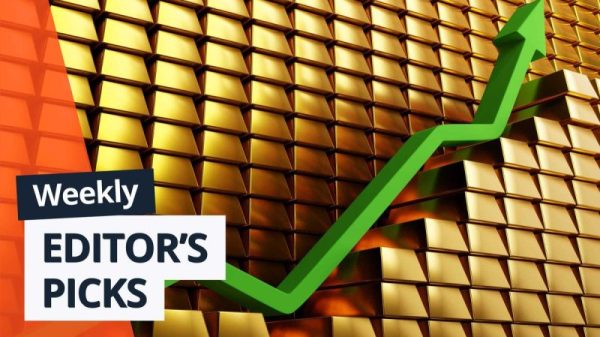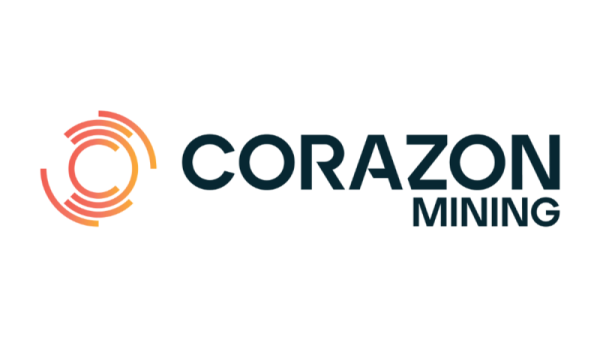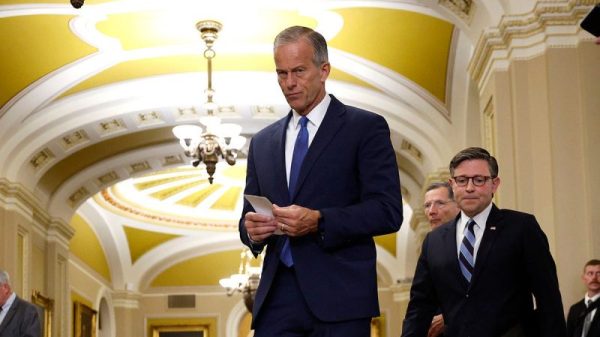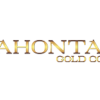Inflation likely remained elevated once again for the month of March, adding another round of price increases to Americans’ already-strained wallets.
On paper, the U.S. economy looks solid. The unemployment rate has now remained below 4% for the longest stretch since the 1960s. Stocks are at all-time highs. The economy continues to add jobs.
But since the start of the pandemic, Americans have seen average prices increase more than 20% overall — giving people a sense that the cost of many goods and services, not to mention housing, has surged to unreasonable levels.
On Wednesday, the Bureau of Labor Statistics will report inflation readings for March. The consensus forecast is 3.5%, up from 3.2% in February. Excluding food and energy, which represent commodities with more volatile prices, the so-called core reading is expected to have declined slightly, from 3.8% to 3.7%.
So what will cause price growth to finally slow down to the Federal Reserve’s 2% target?
Unfortunately, it usually takes a major economic crisis for broad categories of prices to reverse. Instead, the best consumers can hope for is that they stop going up so fast.
While there are some signs that it’s happening — grocery price increases, for instance, have finally fallen below 2% after surging during the pandemic — economists say it’s likely to still take some time for inflation to truly subside.
Complex economic forces, they say, continue to keep price growth elevated.
A significant worker shortage sparked by the pandemic — especially for front-line service employees — helped push hourly pay higher. But this resulted in pushing up prices on the consumer side, since labor costs represent a significant portion of the overall cost of a given good or service.
Meanwhile, supply-chain disruptions that emerged during the pandemic have yet to fully subside, said Sarah House, a managing director and senior economist at Wells Fargo.
She pointed to automobile prices, which have surged more than 20% since the start of the pandemic for new vehicles and more than 30% for used vehicles. While the pace of their price increases has abated, difficulties in sourcing auto parts, plus the loss of experienced technicians, have pushed vehicle prices higher.
This, in turn, has pushed auto insurance rates higher — and it turns out that car insurance commands a significant percentage of the overall increase in consumer prices.
“The services side is where we’re continuing to see stronger [price] growth,” House said. “That’s where we’re still getting an elevated degree of inflation from.”
Americans’ pay has barely kept up with the price increases. While federal stimulus at the outset of the pandemic helped give people a cash cushion during the worst of it, there is an emerging consensus that this same cushion helped drive prices higher by giving people money to spend.
On net, Bureau of Labor Statistics data shows that the effect of inflation has caused Americans’ average hourly pay to rise by just a few cents compared with where it was at the start of the pandemic.
The Federal Reserve, which is in charge of taming price growth, in part by raising and lowering interest rates, has sought to fight fire with fire. By raising the cost of borrowing money, the central bank has tried to reduce demand for goods and services, ultimately pushing price growth down.
The Fed’s interest rate hikes have indeed caused borrowing costs for everything from credit cards to automobiles to homes to climb to levels not seen in years.
For many Americans, that’s meant getting locked out of the housing market, not to mention paying credit card rates above 20% and auto loan rates above 8%.
But inflation has persisted, surprising many economists. At the start of the year, the consensus forecast was for economic growth to slow, allowing the Fed to start cutting interest rates this spring, with a total of three cuts for 2024.
But a growing number of analysts now say that, at a minimum, rate cuts will be delayed. Still others say there won’t even be three cuts.
Despite all the challenges, the risk of a recession that would lead to significant job losses remains low. Yet there are signs that consumer jitters are accelerating. The New York Federal Reserve reported Monday that fears of job losses are climbing and that workers who are already out of a job say getting hired is now more difficult than it was prior to the pandemic.
While about one-quarter of Americans report their household financial situation to be better than a year ago, about one-third report being worse off.
It all adds up to a precarious situation. In a speech last week, Federal Reserve Chair Jerome Powell called the economic outlook ‘still quite uncertain.’
‘The job of sustainably restoring 2% inflation is not yet done,’ Powell said.







































